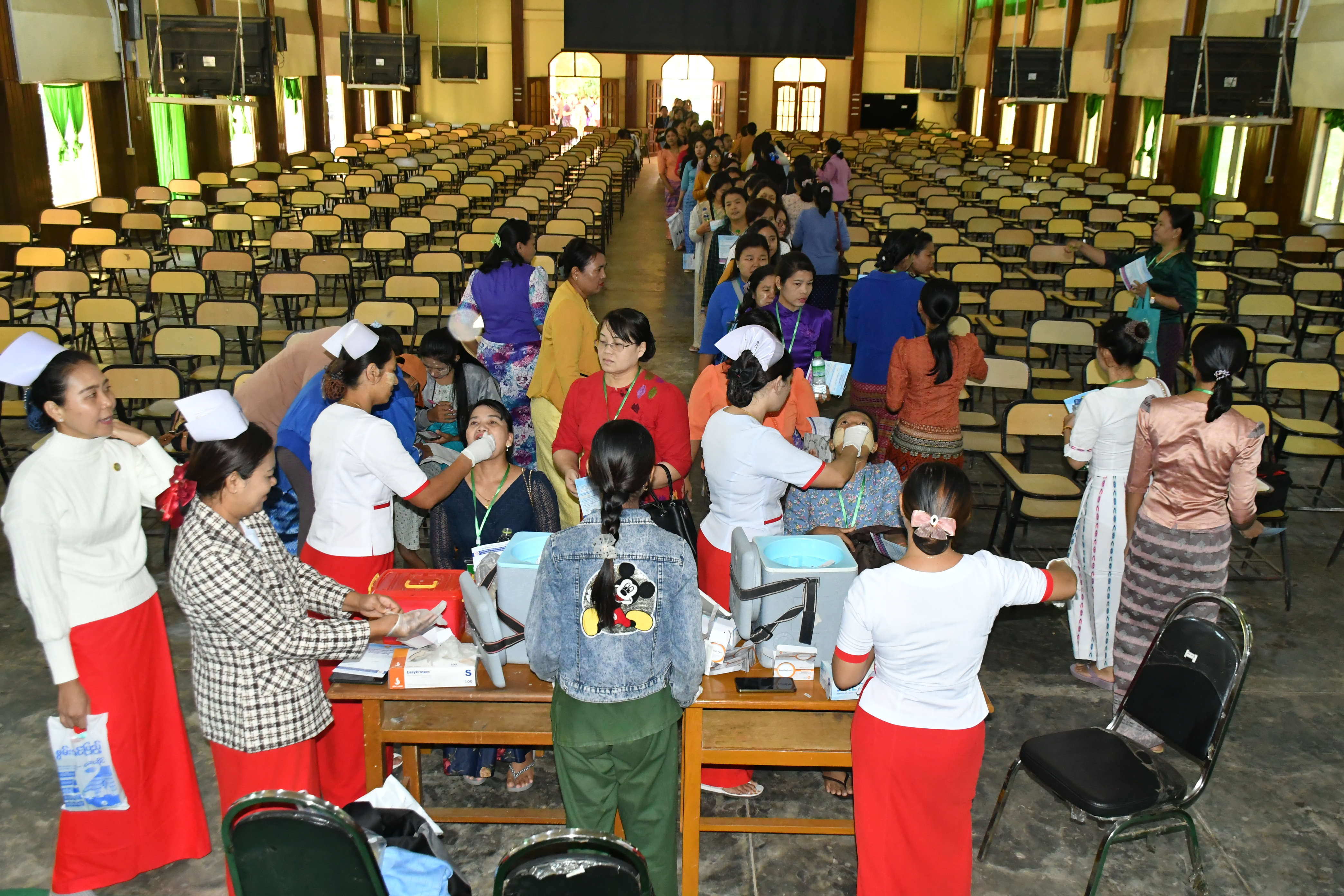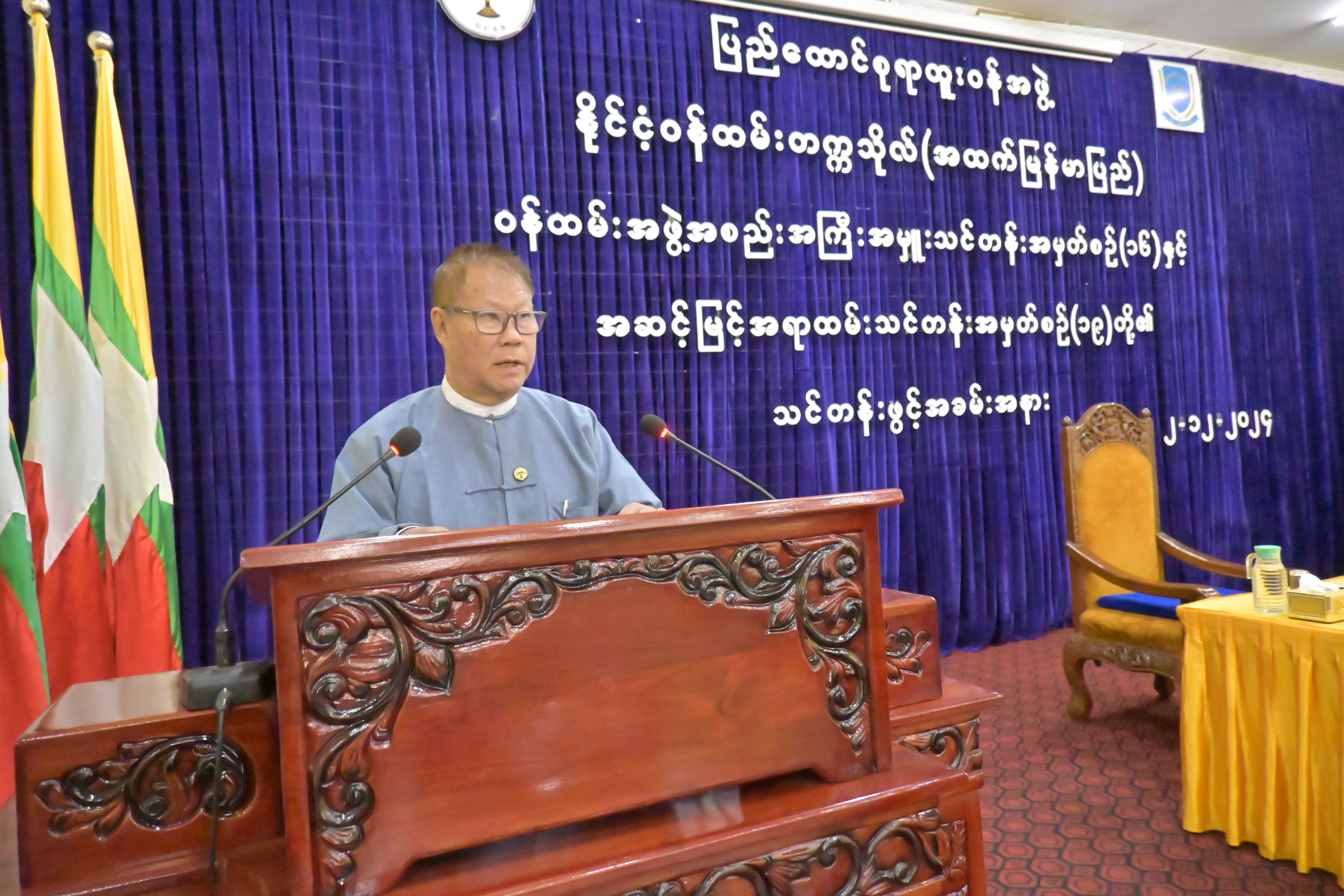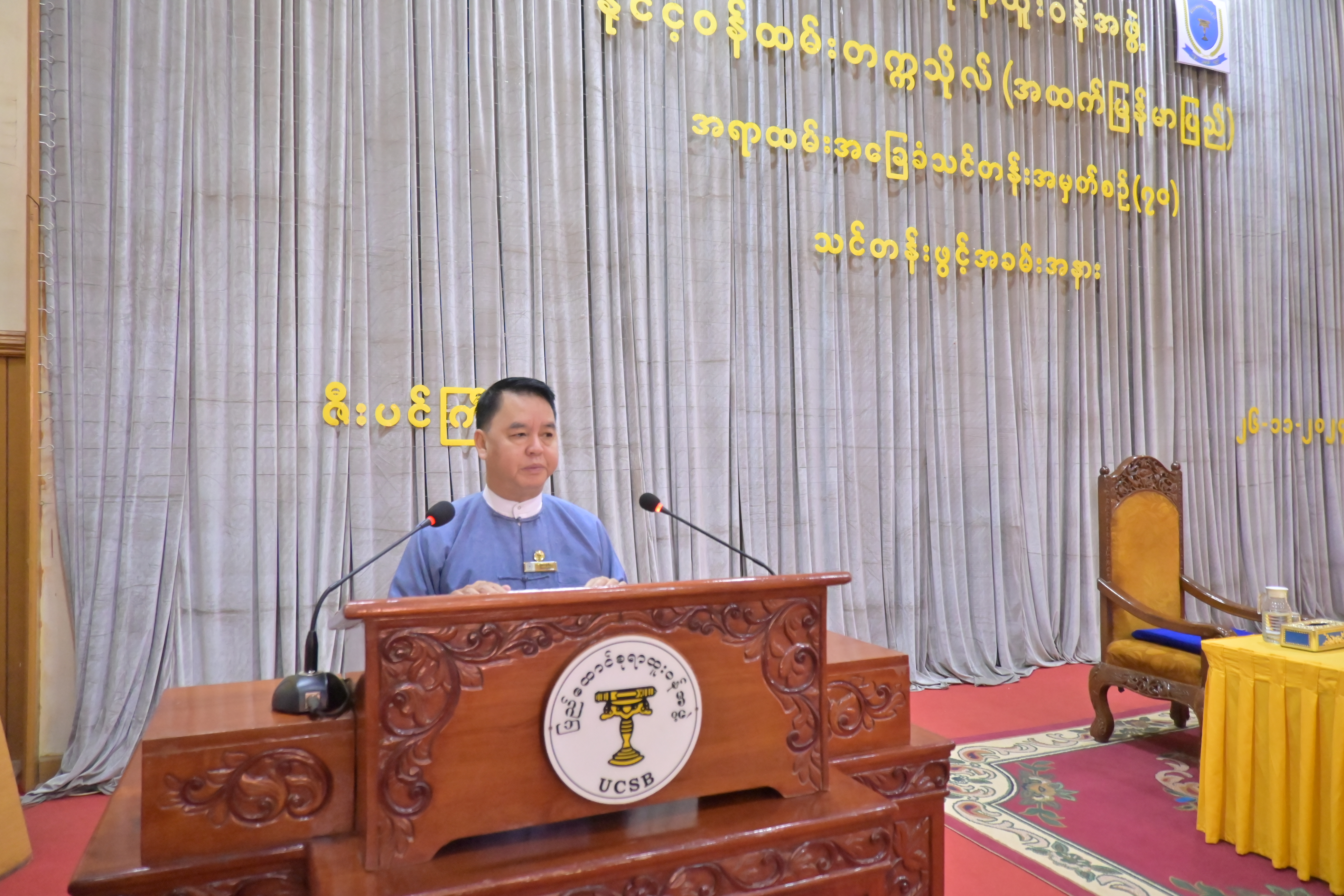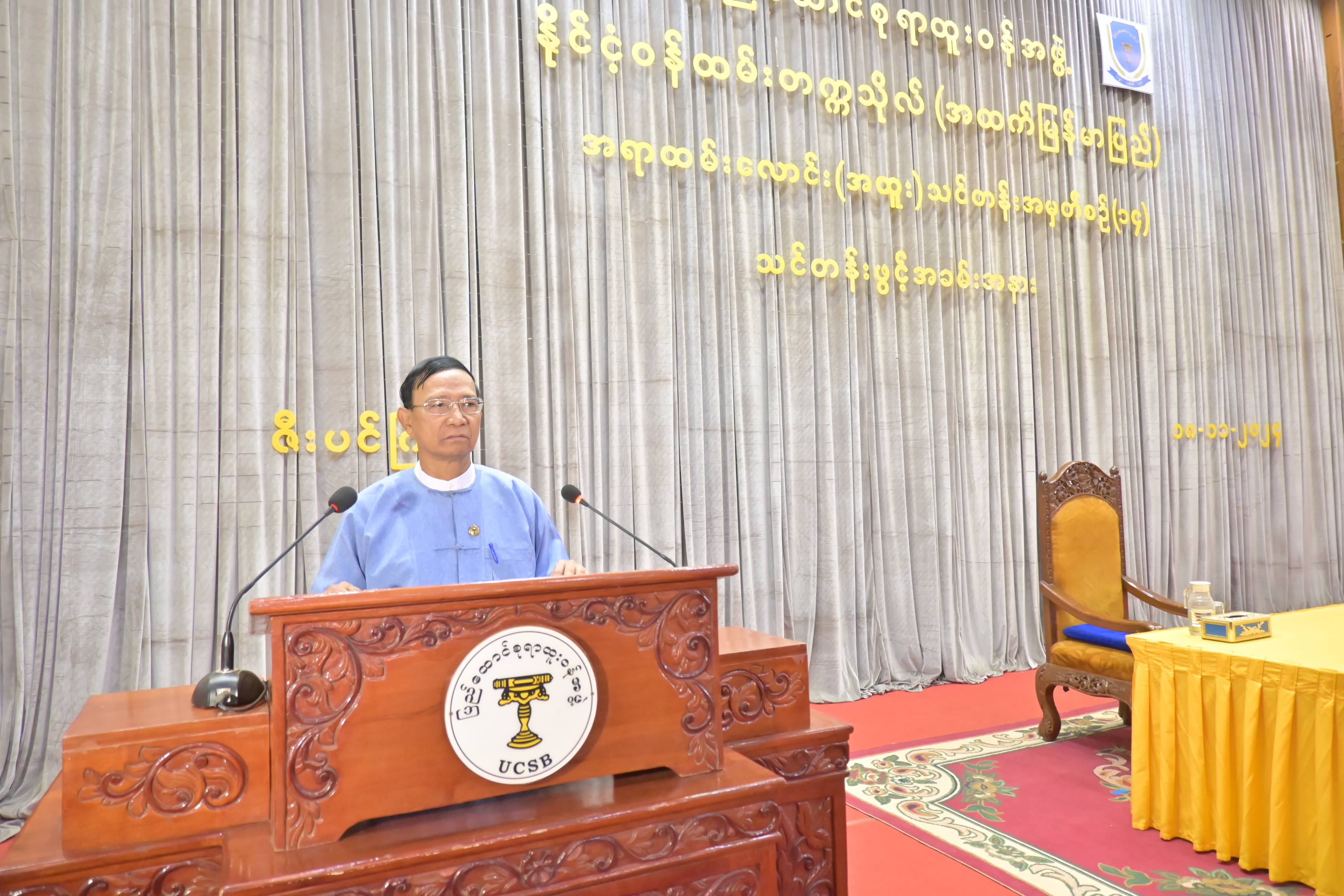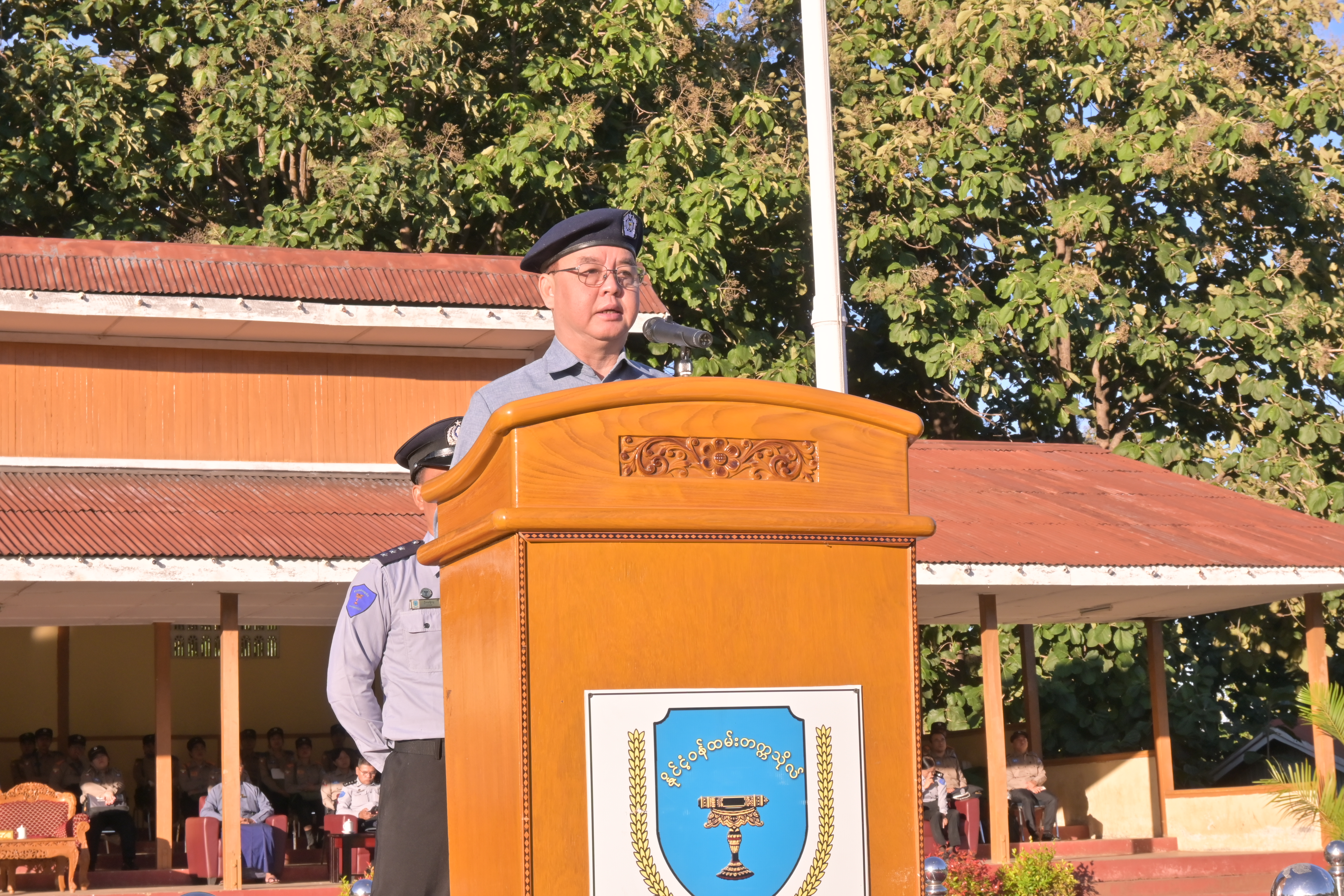တတိယအကြိမ် စာတမ်းဖတ်ပွဲ
နိုင်ငံ့ဝန်ထမ်းတက္ကသိုလ်(အထက်မြန်မာပြည်)၏ (၂၅)နှစ် မြောက်တက္ကသိုလ် ငွေရတုနှစ်ပတ်လည်နေ့ အထိမ်းအမှတ် အဖြစ် တတိယအကြိမ် စာတမ်းဖတ်ပွဲ ကို ၂၇-၁-၂၀၂၀၄ရက်နေ့ နှင့် ၂၈-၁-၂၀၂၄ ရက်နေ့များတွင် အွန်လိုင်းဖြင့် ကျင်းပခဲ့ပါသည်။ အဆိုပါစာတမ်းဖတ်ပွဲတွင် ရုရှားနိုင်ငံ၊ အာဆီယံနိုင်ငံများ၊ ကျန်းမာရေးဝန်ကြီးဌာန၊ မန္တလာဒီဂရီကောလိပ်၊ စစ်ကိုင်းပညာရေးတက္ကသိုလ် ၊ နည်းပညာတက္ကသိုလ်(ရတနာပုံဆိုက်ဘာစီးတီး)၊ ရေဆင်းစိုက်ပျိုးရေးတက္ကသိုလ်နှင့် နိုင်ငံ့ဝန်ထမ်းတက္ကသိုလ် (အောက်မြန်မာပြည်) တို့မှ စာတမ်းပေါင်း (၂၂)စောင်ကို ဖတ်ကြားခဲ့ကြပါသည်။ ဖတ်ကြားခဲ့ပြီး Poster Section အတွက် စာတမ်း(၈)စောင်တင်ပြခဲ့ကြပါသည်။ စာတမ်းခေါင်းစဉ်များမှာ အောက်ပါ အတိုင်း ဖြစ်ပါသည်-
နိုင်ငံ့ဝန်ထမ်းတက္ကသိုလ်(အထက်မြန်မာပြည်)
(၂၅)နှစ်မြောက် တက္ကသိုလ်ငွေရတုနှစ်ပတ်လည်နေ့အထိမ်းအမှတ်စာတမ်းဖတ်ပွဲအခမ်းအနားတွင်
Presentation Section ၌ ဖတ်ကြားခဲ့သည့် စာတမ်းခေါင်းစဉ်နှင့်
စာတမ်းရှင်များ၏ အမည်စာရင်း
| စဉ် | စာတမ်းဖတ်ကြားသူအမည်/ရာထူး/ဌာန | စာတမ်းခေါင်းစဉ် | မှတ်ချက် |
| ၁ | Mr. Dmitry Novik
Associate professor, NWIM RANEPA, Russia |
Good Governance Promotion as a Tool of Sustainable Development Policy | |
| ၂ | Ms.Elizaveta Berezina
Senior specialist of the Center for International Project Activities, NWIM RANEPA, Russia |
“Soft-power: Instruments of Public Administration in the Digital Age: a Neo-Institutional Approach” | |
| ၃ | Puttipol Nakarungsee
The Office of the Civil Service Commission ,Thailand |
The Guidelines for Promoting the Ethics of Thailand’s State Officials | |
| ၄ | Chonmas Dharmasakti,
The Office of the Civil Service Commission, Thailand |
OCSC Campus: Nurturing Happiness in The Workplace A Case Study of Well-Being Initiatives for A Healthy Workforce | |
| ၅ | Noor Maya Salleh
Institute Perkhidmatan Awam, Brunei |
Well-Being and Attitudes During Work Hours in Brunei Public Sector | |
| ၆ | MOMER N. SURINGA
Civil Service Commission Region IV, Philippines |
SUPREME HRM: A Proposed Enhanced Framework in PRIME HRM” | |
| ၇ | Melvin S. Domingo
Civil Service Commission Regional Office IV, Philippines |
What’s the Proper Step? Improving Competencies for greater Accountability Through Procurement Personnel’s Strategic Training, Education and Professionalization (Proper STEP) Program of Civil Service Commission Regional Office IV, Philippines” | |
| ၈ | Bathmavathy Dalayga
National Institute of Public Administration, Malaysia |
The G.R.E.A.T Concept: Building a Good Governance Culture in the Malaysian Public Sector” | |
| ၉ | Dr. Chung Thi Kim Chung
Law Lecturer | Faculty of Law | National Academy of Public Administration, Vietnam |
Good Governance and the Rule of Law in Vietnam | |
| ၁၀ | Dr. Thet Naing
Professor, Mandalar University, Myanmar |
Administrative Ethical Reasoning in Good Governance | |
| ၁၁ | Dr. Min Min Swe Zin
professor, University of Technology (Yadanapon Cyber City), Myanmar |
A SWOT Analysis to Improve Quality Management System in Education; A Case Study in UTYCC | |
| ၁၂ | Ms. Yin Min Su
District Education Officer, Sagaing University of Education, Myanmar |
A Study on Leadership Styles of Principals in Basic Education Schools at Taunggyi Township | |
| ၁၃ | Ms. Hnin Hnin Thet
CSA(LM), Myanmar |
The Effect of Academic and Non-Academic Factors on Trainee Satisfaction and Reputation of Civil Service Academy (Lower Myanmar) | |
| ၁၄ | Dr. Than Lwin Tun
Ministry of Health, Myanmar
|
Strategic Power Thinking in the Context of Myanmar for National Development in the 21st Century; Integrated Ideal Power | |
| ၁၅ | Dr. Aye Aye Khaing
Ministry of Science and Technology, Myanmar |
The Art of Managing R&D for Biotechnology Future in Myanmar | |
| ၁၆ | Dr. Aye Aye Khaing
Professor, Yezin Agricultural University, Myanmar |
Feed and Pasture Management Practices of Dairy Farms in Nay Pyi Taw, Myanmar | |
| ၁၇ | Ms. Thida Aye
Assistant Lecturer, CSA(UM), Myanmar |
A Comparative Study on Approaches upon Ethical Issues in Digital Transformation: Estonia and Singapore” | |
| ၁၈ | Mr. Soe Khant Lin
Assistant Lecturer, CSA(UM), Myanmar |
Data-Driven HR: Making Effective Smarter Talent Decisions | |
| ၁၉ | Ms. Yee Yee Mon
Assistant Lecturer, CSA(UM), Myanmar |
A study on Influencing Factors of Choosing Civil Service Career :Trainees in Civil Service Academy (Upper Myanmar) | |
| ၂၀ | Ms. Phyu Phyu Aung
Lecturer, CSA(UM), Myanmar |
Effective Pedagogical Strategies for English Language Teaching
to Civil Servants |
|
| ၂၁ | Ms. Nyein Nyein
Assistant Lecturer, CSA(UM), Myanmar |
Protection of Geographical Indications (GI) in Myanmar | |
| ၂၂ | Ms. K Zin Moe Aung
Assistant Lecturer, CSA(UM), Myanmar |
Study on the Changes of Land Use and Land Cover Using Satellite Imagery: Pyin Oo Lwin Township (2003-2023) |
နိုင်ငံ့ဝန်ထမ်းတက္ကသိုလ်(အထက်မြန်မာပြည်)
(၂၅)နှစ်မြောက် တက္ကသိုလ်ငွေရတုနှစ်ပတ်လည်နေ့အထိမ်းအမှတ်စာတမ်းဖတ်ပွဲအခမ်းအနားတွင်
Poster Section ၌ တင်ပြခဲ့သည့် စာတမ်းခေါင်းစဉ်နှင့်
စာတမ်းရှင်များ၏ အမည်စာရင်း
| စဉ် | စာတမ်းဖတ်ကြားသူအမည်/ရာထူး/ဌာန | စာတမ်းခေါင်းစဉ် | မှတ်ချက် |
| ၁ | Dr. Than Lwin Tun
Deputy Director General |
Global Human Resource Trends and Envisioning Workforce Strategy for National Development | |
| ၂ | U Thet Oo
Associate Professor |
“Views on Geopolitical Strategic Plans of Superpower Countries” | |
| ၃ | Daw Saw Sandar Oo
Lecturer |
“Analysis of Offences Relating to Public Servants” | |
| ၄ | Daw Aye Aye Su
Assistant Lecturer |
“Employee Engagement and Well-being” | |
| ၅ | Daw Nu Nu Lwin
Lecturer |
“Effective Communication Strategies to Improve workplace ” | |
| ၆ | Daw San Ei Mon
Lecturer |
“A Study of Pedagogies for enhancing Self-confidence of English Learners: Tricia Hedge’s Method” | |
| ၇ | Daw Ngu Khaing Khaing Kyaw
Lecturer |
Qualitative Research Studies of Focus Group Discussion (Studied on Important of Online Learning in MAS Program) | |
| ၈ | Daw Khwa Nyo Thet
Lecturer |
“Harmonizing Work-Life Balance and Mental Health Nurturing flourishing Workforce” |
3rd Conference on “Learning and Development to Support Good Governance” 27-28 January 2024
Since its foundation in 1999, the milestone of Civil Service Academy (Upper Myanmar) has been reached 25 years. The Conference will be convened to commemorate the 25th anniversary (a silver jubilee) of the university with the following objectives;
- To gain good experiences for convening conferences started from tertiary level through national level to the international level
- To bring out the outstanding papers that support the Public Policy ,Public Administration, Public Management and Good Governance
- To cultivate the culture of doing research and submitting research paper by the faculties of CSA
- To strengthen the collaboration and cooperation of CSAs and other Universities
For the 3rd Conference on Learning and Development to support Good Governance, 2024, we would like to invite submissions of papers from both academic and government sectors that contribute to the exploration of “Learning and Development to Support Good Governance” in an ever-changing world. We welcome the following types of papers and areas of papers:
Types of Papers
- Research Papers: These typically include empirical studies, theoretical analyses, or conceptual frameworks that contribute to the academic understanding of the conference theme.
- Case Studies: These focus on real-world experiences, initiatives, or programs, providing practical insights and lessons learned.
- Policy Papers: These involve policy analyses, evaluations, or recommendations that address relevant issues in line with the conference theme.
- Practitioner Perspectives: These invite professionals from the field to share their practical experiences, challenges, and innovative approaches.
Language and Format
- Any one of Myanmar or English languages can be used.
- The format is attached here! Myanmar+Eng Format
Important Dates
Abstract, full papers and revised papers are kindly requested to send not late than the following deadlines:
- Submission of abstracts: 7 August 7, 2023
- Submission of the full papers: 31 October, 2023
- Submission of Revised papers: December 18, 2023
- Conference Date: 1-2 February 2024
Please submit your abstract and full papers to the following email address;
Conference Venue
Civil Service Academy (Upper Myanmar), Zee Pin Gyi, Pyin Oo Lwin Tsp.,
Contact Address
- Phone No: 095-02-4750005, 02-4750274, 09-770621622
- Email : research4members@gmail.com
- ag@gmail.com,
- edudep2020@gmail.com
- conference25@gmail.com
Call For Paper can be downloaded here! Appendix(Call for paper)
- Capacity Building for Effective Governance:
- Building the knowledge and skills of public officials and leaders for better governance.
- Enhancing governance capabilities through training, mentoring, and coaching programs.
- Strengthening the capacity of governance institutions through learning initiatives
- Innovations in Learning for Governance:
- Leveraging technology for learning and development in governance.
- E-learning, virtual classrooms, and other innovative approaches for governance training.
- Case studies on successful implementations of learning innovations in governance.
- Ethical Leadership and Governance:
- Promoting ethical behavior and integrity in governance through learning and development.
- Fostering ethical decision-making skills among leaders and public officials.
- Developing ethical leadership capabilities to enhance governance practices.
- Understanding the Changing Global Context:
- Analyzing global trends, challenges, and opportunities that impact governance.
- Exploring the influence of technological advancements, globalization, and environmental changes on governance.
- Identifying emerging issues and their implications for policy formulation in governance.
- Talent Management and Development:
- Strategies for attracting, selecting, and retaining talent in the public and private sectors.
- Learning and development initiatives for building a skilled and competent workforce.
- Succession planning and leadership development in the context of good governance.
- Talent analytics and data-driven HRM practices for effective decision-making.
- Employee Engagement and Well-being:
- Promoting employee engagement, motivation, and satisfaction in the workplace.
- Work-life balance, mental health, and well-being initiatives for a healthy workforce.
- Creating a positive organizational culture that supports good governance.
- Employee recognition and reward systems to foster performance and productivity.
- Performance Management and Appraisal:
- Designing effective performance management systems for public and private organizations.
- Performance appraisal methods, feedback mechanisms, and goal setting for accountability and continuous improvement.
- Linking performance management with organizational goals and good governance outcomes.
- Balancing performance-based incentives with ethical considerations in HRM.
- HR Technology and Digital Transformation:
- Leveraging HR technology and digital tools for efficient HRM practices.
- Automation and AI in HRM processes (e.g., recruitment, onboarding, performance management).
- Ethical considerations and privacy concerns in HR technology adoption.
- Upskilling HR professionals for the digital era.
- Law:
- a comparative analysis of legal systems and their impact on economic development.
- Legal implications of digital transformation and emerging technologies.
- Legal aspects of data protection, privacy, and cybersecurity.
- Economics:
- Economic policies for sustainable development and inclusive growth.
- Economic implications of digital disruption and automation.
- Financial governance and regulation in the digital era.
- Impact of globalization and trade policies on economic governance.
- Behavioral economics and its implications for policymaking.
- Political Science:
- Role of political institutions in promoting good governance and accountability.
- Comparative analysis of political ideologies and their influence on governance.
- Political economy of digital transformation and its societal implications.
- Role and effectiveness of international organizations (e.g., United Nations, World Bank, IMF) in promoting good governance.
- Multilateral cooperation and governance challenges in addressing global issues (e.g., climate change, migration, terrorism).
- Power dynamics and influence in global governance structures.
- Regional organizations and their role in regional governance.
- Digital Technology:
- Governance challenges and opportunities in the era of digital transformation.
- Regulatory frameworks for emerging technologies (e.g., AI, blockchain, IoT).
- Digital governance and e-government strategies for effective service delivery.
- Ethical considerations in the development and use of digital technologies.
We encourage submissions from scholars, researchers, policymakers, practitioners, and other professionals working in academia, government agencies, and related fields on 3rd conference on 25th Annual Day.
Please note that all papers should be original and not previously published or currently under review elsewhere. Submissions should adhere to the specified formatting guidelines and word limits.
We look forward to receiving your papers and engaging in enriching discussions at the conference.
Dr.Khin Mar Myo
